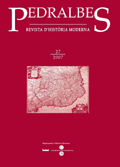El neoestoicismo en la Vida de Boecio (1642) de Don Francisco de Montcada: una propuesta ético-histórica en tiempos de declinación
Keywords:
Francesc de Montcada, Neoestoicism, historiography, seventeenth century.Abstract
Francesc de Montcada (1586-1635) was a politician and historian, active in both fields during the first decades of the seventeenth century. As a historian his most known work is Expedición de los catalanes y aragoneses contra turcos y griegos (1623). He also wrote a Vida de Boecio, posthumously published in Frankfurt in 1642 thanks to the count of Rebolledo. While currently hardly known, this latter work enjoyed a fairily good diffusion at the time, as can be seen from the several manuscript copies kept at the Biblioteca Nacional, Spain. This article has two basic goals: first, to present a text that today has been practically forgotten; second, to analyze its key elements and the conceptual mechanisms of the Neoestoic mouvement, which combined tradition and cultural innovation, both of them clearly present in Montcada’s work.Downloads
Published
How to Cite
Issue
Section
License
Copyright (c) 2007 Xavier Baró i Queralt

This work is licensed under a Creative Commons Attribution-ShareAlike 4.0 International License.
Authors must agree with the following terms:
1. The author keeps authorship rights, ceding the journal the right to first publication.
2. Texts will be disseminated with a Creative Commons Attribution 4.0 International License. Which allows for the work to be shared with third parties, as long as they recognise the work’s authorship, the original publication in the journal and licensing conditions.
This requires acknowledging authorship appropriately, providing a link to the license, and indicating if any changes have been made. It can be indicated in any reasonable way, but not in a manner that suggests the licensor endorses or sponsors the use of the text.
If content is remixed, transformed, or new content is created from the journal's texts, it must be distributed under the same license as the original text



